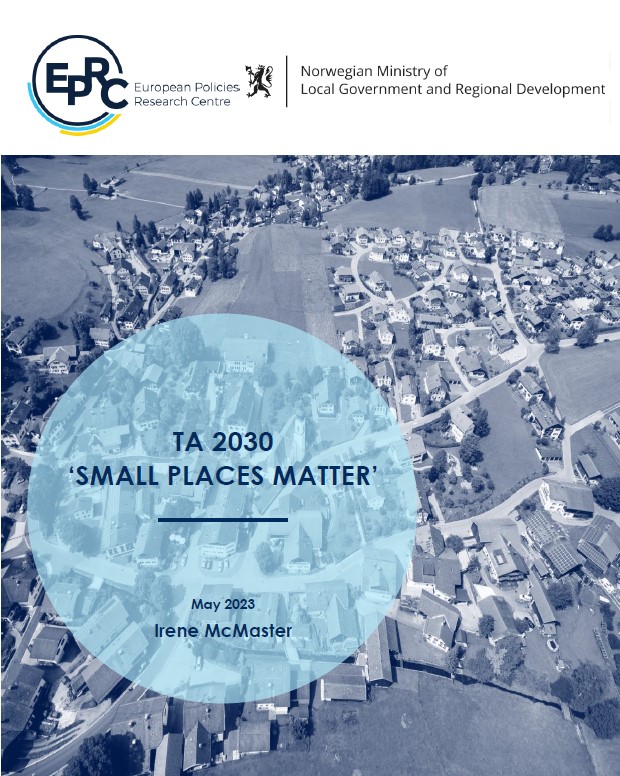Small places matter: Understanding how small places can boost their role for the development of a wider territory
 Small and medium-sized places are an important pillar of Europe’s territorial DNA and home to a large part of Europe’s population. The pilot action’s focus is on the vital role of small towns and villages in the development of integrated territorial development processes, strengthening the territorial coordination of policies and cooperation between territories. The work addresses the questions: how can the Territorial Agenda become relevant for small places; and how can small places be ‘boosted’ in their role for territorial development? Of particular importance to the pilot action is finding new ways to strengthen the link between insights and momentum from bottom-up/local initiatives and top-down planning processes in relation to demographic change in small places and boosting their attractiveness to younger people either staying in the area or moving into it.
Small and medium-sized places are an important pillar of Europe’s territorial DNA and home to a large part of Europe’s population. The pilot action’s focus is on the vital role of small towns and villages in the development of integrated territorial development processes, strengthening the territorial coordination of policies and cooperation between territories. The work addresses the questions: how can the Territorial Agenda become relevant for small places; and how can small places be ‘boosted’ in their role for territorial development? Of particular importance to the pilot action is finding new ways to strengthen the link between insights and momentum from bottom-up/local initiatives and top-down planning processes in relation to demographic change in small places and boosting their attractiveness to younger people either staying in the area or moving into it.
Rationale and link to Territorial Agenda
The pilot action directly engages with a number of priorities set out in the Territorial Agenda 2030, including ‘Balanced Europe’ and ‘Functional Regions’. More specific links are with the aims: to encourage all area types to cooperate on improving conditions in all areas, recognise the potential in areas with specific geographies (in this case more remote areas), and support dialogue with decision makers in towns of all sizes to apply an integrated multilevel governance approach.
The pilot action addresses key challenges set out in the Territorial Agenda 2030, in particular demographic and societal imbalances, and quality of life. The pilot action’s focus on the vital role of small towns and villages in the development of integrated territorial development processes also strengthens territorial coordination of policies and cooperation between territories, which are key elements of putting the Territorial Agenda 2030 into action.
Envisaged activities
The envisaged activities include:
- an initial meetings to exchange ideas and refine the focus between interested stakeholders,
- a phase to ‘harvest’ projects, identifying existing areas of relevant activity,
- followed by opportunities to showcase examples and network building activities.
As experienced in one of the selected projects, there is an opportunity to build a ‘cavalcade network’, which would be dynamic and evolving rather than a fixed partnership. Particular areas of interest already identified are around the issue of fostering educational and business links to boost the attractiveness of small towns, through working cross-sectorally to build capacity for local skills and jobs, and address territorial needs.
Partner exchanges have the potential to develop specific areas of interest to be followed up through targeted analyses in ESPON or Interreg projects, or working in new ways, e.g. through engagement with macroregional strategies and integrated territorial instruments.
Envisaged lessons and results
Key lessons/results from the pilot actions include the following elements:
- First, the pilot action will identify practical tools and approaches to address specific issues linked to demographic change in small places and boosting their attractiveness to younger people either staying in the area or moving into it.
- Second, the pilot action will highlight the importance of recognising and capitalising on existing activities and interactions in mobilising the Territorial Agenda. For example, Interreg programmes have already supported relevant projects. Their value and impact could be amplified through opportunities for wider exchange and support for capitalisation of their activities.
- Third, the pilot action will support better policy making, better linking the value in bottom-up, locally-oriented initiatives with regional and national level policy/strategy development and better mapping challenges and solutions, with a view to informing policy. It would also address an identified development gap which is not being addressed successfully either through market interventions or traditional regional policy interventions and demands new thinking, solutions and activities.
- Finally, the pilot action offers the scope to look to the future and consider how the COVID-19 crisis could inform thinking on small places responding to change, the desirability of more balanced development and the role of small places.
Envisaged Dissemination
The opportunity to showcase and capitalise on ongoing, innovative actions is a key part of the pilot action. Partners in the pilot action aim to build new networks and links with interested territories and also use established networks to disseminate results. The pilot action can also use the Territorial Agenda hashtag to showcase and disseminate results.
Resources
The pilot action will primarily focus on scope to link and capitalise on existing interventions. Specific areas of interest could lead to joint project proposals for ESPON, Interact and other Interreg Programmes.
Time planning
A third partner meeting is planned for September 2021. The meeting is an opportunity to broaden input on the direction and evolution of the pilot action. The pilot action is expected to run for a period of 3 years.
Indicative partners
Partner contacts have been identified in Germany, Poland, Finland, Ireland and Switzerland, Sweden and Romania, and also the European Commission (DG REGIO and DG AGRI).
In addition, regional and local administrations in Norway have expressed an interest in the pilot action and links identified to a number of relevant project actions in different Interreg programmes.
Lead stakeholder
Ministry of Local Government and Modernisation, Norway
Jan Edøy (Jan.Edoy@kdd.dep.no)
Key messages/ results/ updates:
The pilot’s focus is the vital role of small towns and villages in the development of integrated territorial development, strengthening the territorial coordination of policies, and cooperation between territories. Small towns and villages have a key role in rural regions, especially in relation to maintaining and developing small places as attractive places to live and work for young populations and identifying ways to strengthen the links between insights and momentum from bottom-up/local initiatives and top-down planning processes.
Following initial meetings establishing the partnership, pilot activities includes: a phase to ‘harvest’ projects, identify existing areas of relevant activity, and opportunities to showcase examples and network building activities. In line with the Territorial Agenda 2030, the pilot highlights the importance of all area types to cooperate on improving sustainable conditions in all areas, recognise the potential in areas with specific geographies, including rural and remote areas, and support dialogue with decision makers in towns of all sizes to apply an integrated multilevel governance approach. The EU Presidency, DG Agri, DG Regio and ESPON were active participants in the inception dialogues on the pilot and have highlighted opportunities for on-going engagement, and, in particular, the relevance of work on the Rural Vision.
On the occasion of the European Week of Regions and Cities the TA2030 Pilot Action Small Places Matter was present and organised a workshop. The workshop could be replayed from the following links:
- English: https://vimeo.com/636620449
- Deutsch: https://vimeo.com/636833075
- Original Language: https://youtu.be/-adkcX3FrwM
Since the last up date, plans have been developed to set up a series of informal seminars/workshop on key areas of interest. Possible (interrelated) themes:
- Regional policy overview – the visibility of small places in regional policy
- Knowledge exchange and capacity building for strategic engagement
- Administrative capacity building (Small Town Academy, Experience in Poland)
- Supporting intermunicipal/community cooperation – to address issues of territorial scale and resource limitation
- Sweden, Norway
- Possible information event along with ESPON?
- The role of crossborder cooperation
- Climate Action (joint event initiative with Alpine pilot action)?
Each workshop would have a two page summary note on key lessons, best practice examples and potential actions.
Workshop outputs can be collated to make a tool-kit type publication/output.
Final Report

| 20th January 2021 | Kick off meeting for the Partnership. |
| 18th February 2021 | Participation in the ESPON Joint session Pilots LAB TA2030, promoted by PT PRES & ESPON |
| 16th March 2021 | Participation in the event “Territorial Cooperation Agenda 2030: Bringing Territoriality into Interreg”, promoted by Interact |
| 25th March 2021 | Participation in the event “Territorial Agenda 2030: a future for all places, a future for rural areas”, integrated in the ‘Rural Vision Week: Imagining the future of Europe’s and promoted by PT PRES |
| 28th April 2021 | 2nd Partnership meeting |
| 6th May 2021 | Participation in the pilot action “A future for lagging regions: fostering the implementation of spatial strategies” kick-off event “Putting the Territorial Agenda 2030 into practice”, promoted by the German Federal Ministry of the Interior, Building and Community (BMI) and the German Federal Institute for Research on Building, Urban Affairs and Spatial Development (BBSR) |
| October 2021 | Session at week of EU Cities and Regions |
| November 2021 | Third partner meeting
|
| Presentation of the pilot Action to the European Network for Rural Development | |
| April 2022 | Fourth Partner meeting and workshop
|
| Date | Main Activities |


